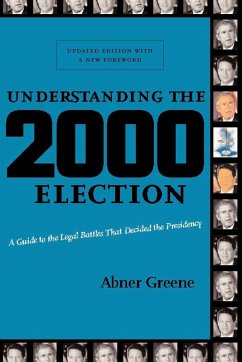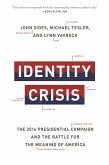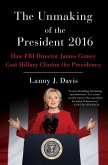Paperback Edition: Updated and with a New Foreword
The nation will not soon forget the drama of the 2000 presidential election. For five weeks we were transfixed by the legal clashes that enveloped the country from election night to the Gore concession. It was instant history, and will be studied by historians, lawyers, political scientists, media critics and others for years to come.
Even for those who followed the events most closely, the legal twists and turns of the post-election struggles seemed at times bewildering. We witnessed manual recounts of election ballots, GOP federal court lawsuits challenging those recounts, two Florida Supreme Court opinions, lawsuits over butterfly and absentee ballots, questions about the role of the Florida legislature and the United States Congress in resolving presidential election disputes, and two United States Supreme Court decisions, the second of which finally handed the election to Bush. Although the 2000 Presidency was decided through much legal wrangling, one should not have to be a lawyer to understand how we came to have Bush rather than Gore as our President in that hotly contested election.
Understanding the 2000 Election offers an accessible, comprehensive guide to the legal battles that finally gave George W. Bush the Presidency five weeks after election night. Meant to stand next to and clarify the numerous journalistic and personal accounts of the election drama, Understanding the 2000 Election offers a offers a step-by-step, non-partisan explanation and analysis of the major legal issues involved in resolving the presidential contest. The volume also offers a clear overview of the Electoral College, its history, what would be involved in switching over to a direct election, and the likely future of the Presidential electoral process. While some still decry the 2000 election outcome as the result of political manipulation rather than the rule of law, Greene shows that almost every legal conclusion of the post-election struggle can be understood through the application of legal principle, rather than politics.
The nation will not soon forget the drama of the 2000 presidential election. For five weeks we were transfixed by the legal clashes that enveloped the country from election night to the Gore concession. It was instant history, and will be studied by historians, lawyers, political scientists, media critics and others for years to come.
Even for those who followed the events most closely, the legal twists and turns of the post-election struggles seemed at times bewildering. We witnessed manual recounts of election ballots, GOP federal court lawsuits challenging those recounts, two Florida Supreme Court opinions, lawsuits over butterfly and absentee ballots, questions about the role of the Florida legislature and the United States Congress in resolving presidential election disputes, and two United States Supreme Court decisions, the second of which finally handed the election to Bush. Although the 2000 Presidency was decided through much legal wrangling, one should not have to be a lawyer to understand how we came to have Bush rather than Gore as our President in that hotly contested election.
Understanding the 2000 Election offers an accessible, comprehensive guide to the legal battles that finally gave George W. Bush the Presidency five weeks after election night. Meant to stand next to and clarify the numerous journalistic and personal accounts of the election drama, Understanding the 2000 Election offers a offers a step-by-step, non-partisan explanation and analysis of the major legal issues involved in resolving the presidential contest. The volume also offers a clear overview of the Electoral College, its history, what would be involved in switching over to a direct election, and the likely future of the Presidential electoral process. While some still decry the 2000 election outcome as the result of political manipulation rather than the rule of law, Greene shows that almost every legal conclusion of the post-election struggle can be understood through the application of legal principle, rather than politics.
Dieser Download kann aus rechtlichen Gründen nur mit Rechnungsadresse in A, D ausgeliefert werden.









